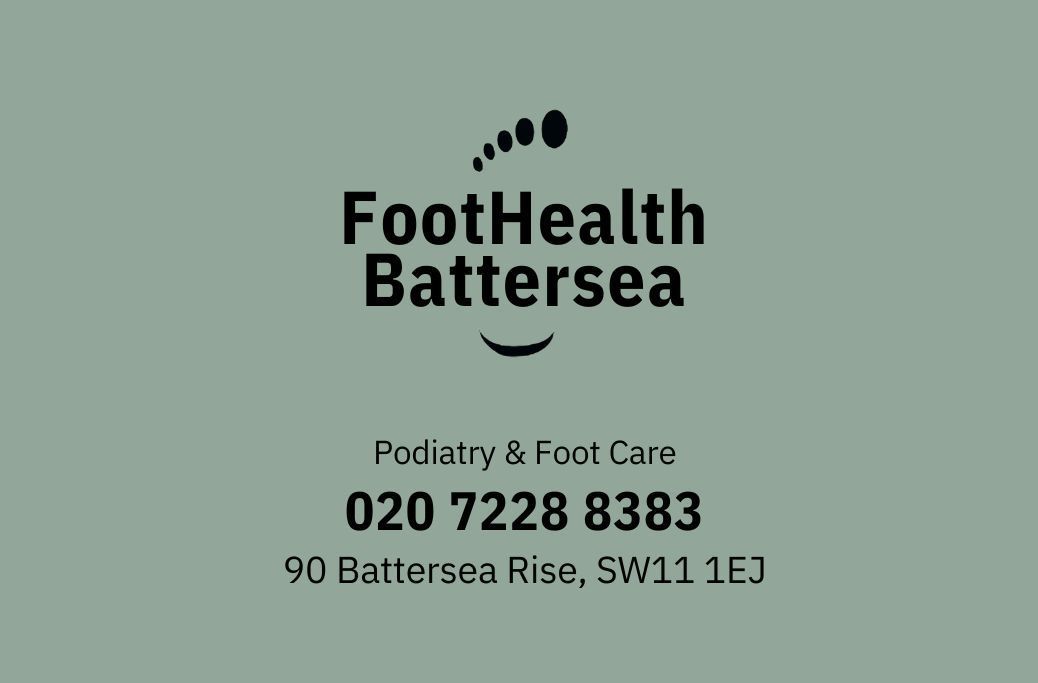020 7228 8383 info@foothealthbattersea.co.uk
Understanding Ingrown Toenails
The Importance of Professional Foot Care

Ingrown toenails, though common, can cause significant discomfort and complications if not properly managed. At FootHealth Battersea, our team of experienced podiatrists and chiropodists specialises in the diagnosis, treatment, and prevention of ingrown toenails, ensuring your feet receive the care they deserve for optimal health and comfort.
What Are Ingrown Toenails? Ingrown toenails occur when the edge of a toenail grows into the surrounding skin, leading to pain, inflammation, and potentially infection. This condition primarily affects the big toe and can be triggered by factors such as improper nail trimming, wearing tight-fitting shoes, or inheriting the tendency for curved nails.
Why professional care matters
Seeking professional care at FootHealth Battersea is essential for several compelling reasons
- Accurate Diagnosis: Our podiatrists are trained to assess the severity of ingrown toenails and recommend appropriate treatment plans tailored to your specific condition.
- Safe Treatment: Attempting to trim or remove ingrown toenails at home can worsen the problem and increase the risk of infection. Our specialists use sterile techniques and appropriate tools to safely alleviate discomfort and promote healing.
- Preventive Strategies: Beyond immediate treatment, we provide valuable guidance on proper nail care techniques and suitable footwear choices to prevent recurrence and promote long-term foot health.
The Risks of Ignoring Ingrown Toenails
Ignoring the symptoms of an ingrown toenail can lead to escalating problems.
- Infection: When the skin around the ingrown nail becomes compromised, bacteria can enter and cause infection. Cellulitis, a bacterial skin infection, may require oral antibiotics and can spread if not promptly treated.
- Abscess Formation: Pus-filled abscesses can develop, causing intense pain and discomfort. Drainage of such abscesses may be necessary to alleviate symptoms.
- Chronic Conditions: Recurrent ingrown toenails can lead to chronic pain and affect mobility, significantly impacting your quality of life.
Treatment Options
Depending on the severity and recurrence of ingrown toenails, treatment options may include:
- Conservative Management: Soaking the affected foot in warm water with Epsom salts, gently lifting the nail edge, and applying antibiotic ointment to reduce inflammation and prevent infection.
- Partial Nail Avulsion: surgical removal of the ingrown portion of the nail under local anesthesia. This procedure aims to prevent future occurrences by reshaping the nail edge.
- Matrixectomy: In severe cases where ingrown toenails recur persistently, a matrixectomy may be recommended. This surgical procedure involves removing a portion of the entire nail matrix to prevent regrowth.
Recovery and Aftercare
After treatment, proper post-operative care is crucial to ensuring a smooth recovery.
- Monitoring: Regular follow-up appointments allow our specialists to monitor healing progress and address any concerns promptly.
- Foot Hygiene: Practicing good foot hygiene, including keeping the affected area clean and dry, helps prevent infection and promote healing.
- Footwear and Nail Care: Wearing comfortable shoes that provide ample room for toes and trimming nails straight across can prevent future ingrown toenails.
At FootHealth Battersea, we prioritise the health and comfort of your feet. Our dedicated team of podiatrists and chiropodists is committed to providing compassionate care and effective treatments for ingrown toenails. By addressing these issues promptly and professionally, we aim to alleviate discomfort, prevent complications, and promote long-term foot health.
Don’t delay seeking treatment for ingrown toenails. Contact FootHealth Battersea today to schedule a consultation and take the first step towards healthier, pain-free feet.
For more information on ingrown toenails and our specialised services, visit FootHealth Battersea today or book online.
Read More from our Blog
FootHealth Battersea Blog Spot
Can FootHealth Battersea assist you?
Our customers share the best stories! Discover why Foothealth Battersea is the preferred Podiatry clinic in South West, London.












